Leadership
SEARCH BY TITLE
 The Effective Elders Quorum
The Effective Elders Quorum
Modern scripture suggests that priesthood holders are to “bring again Zion” as prophesied by Isaiah. Modern scripture also indicates that elders are to be “standing ministers” (D&C 124:137). This means that stake presidents and bishops count on strong elders quorums in carrying out the mission of the Church—to invite all to come unto Christ and be perfected in Him—through proclaiming the gospel, perfecting the Saints, and redeeming the dead. The challenges in building a strong quorum are great. The quorum is in a state of constant change. Likely there are insufficient active members to cover home teaching assignments. Adult male converts often move away or can’t be located. Prospective elders often outnumber the active elders. Faithful elders often travel or move for employment or educational reasons. Some are called as high priests or receive major assignments outside the quorum. So the question is, how does an elders quorum that is in constant flux grow in strength? President Stephen L Richards (1879–1959), First Counselor in the First Presidency, taught: “A quorum is three things: first, a class; second, a fraternity; and third, a service unit. Within it the men of the Priesthood learn of the principles of the Gospel, establish true brotherhood, and carry forward the work of Christ. It is a God-given association from which they derive more of lasting advantage than from any other fraternal organization in our society. Its prime purpose is to encourage and safeguard the individual.” By President Richards’s definition, the way to build a strong quorum is to: Strengthen the bond of brotherhood among all quorum members, Learn fundamental doctrines and priesthood duties, Fulfill service assignments involving the entire quorum. Following are a few practical suggestions on how to accomplish these quorum-building activities.
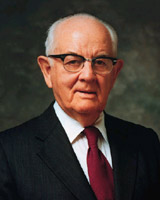 Jesus: The Perfect Leader
Jesus: The Perfect Leader
The Savior’s leadership was selfless. He put himself and his own needs second and ministered to others beyond the call of duty, tirelessly, lovingly, effectively. So many of the problems in the world today spring from selfishness and self-centeredness in which too many make harsh demands of life and others in order to meet their demands. This is a direct reversal of the principles and practices pursued so perfectly by that perfect example of leadership, Jesus of Nazareth. Jesus’ leadership emphasized the importance of being discerning with regard to others, without seeking to control them. He cared about the freedom of his followers to choose. Even he, in those moments that mattered so much, had to choose voluntarily to go through Gethsemane and to hang on the cross at Calvary. He taught us that there can be no growth without real freedom. One of the problems with manipulative leadership is that it does not spring from a love of others but from a need to use them. Such leaders focus on their own needs and desires and not on the needs of others. Jesus had perspective about problems and people. He was able to calculate carefully at long range the effect and impact of utterances, not only on those who were to hear them at the moment, but on those who would read them 2,000 years later. So often, secular leaders rush in to solve problems by seeking to stop the present pain, and thereby create even greater difficulty and pain later on.
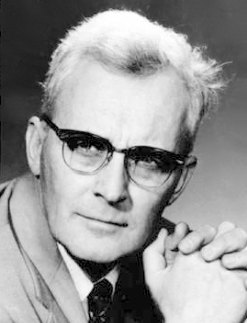 Leaders and Managers
Leaders and Managers
What took place in the Greco-Roman as in the Christian world was that fatal shift from leadership to management that marks the decline and fall of civilizations. At the present time, Captain Grace Hopper, that grand old lady of the Navy, is calling our attention to the contrasting and conflicting natures of management and leadership. No one, she says, ever managed men into battle. She wants more emphasis in teaching leadership. But leadership can no more be taught than creativity or how to be a genius. The Generalstab tried desperately for a hundred years to train up a generation of leaders for the German army, but it never worked, because the men who delighted their superiors, i.e., the managers, got the high commands, while the men who delighted the lower ranks, i.e., the leaders, got reprimands. Leaders are movers and shakers, original, inventive, unpredictable, imaginative, full of surprises that discomfit the enemy in war and the main office in peace. For managers are safe, conservative, predictable, conforming organization men and team players, dedicated to the establishment. . . On the other hand, leadership is an escape from mediocrity. All the great deposits of art, science, and literature from the past on which all civilization is nourished come to us from a mere handful of leaders. For the qualities of leadership are the same in all fields, the leader being simply the one who sets the highest example; and to do that and open the way to greater light and knowledge, the leader must break the mold. “A ship in port is safe,” says Captain Hopper, speaking of management; “but that is not what ships were built for,” she adds, calling for leadership. True leaders are inspiring because they are inspired, caught up in a higher purpose, devoid of personal ambition, idealistic, and incorruptible. There is necessarily some of the manager in every leader (what better example than Brigham Young?), as there should be some of the leader in every manager.
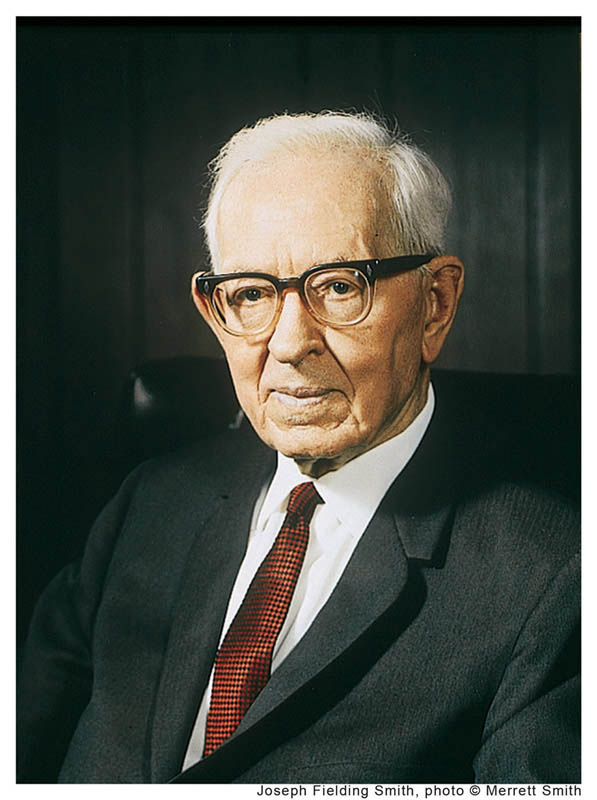 The Reins of Responsibility and Leadership
The Reins of Responsibility and Leadership
I desire to say that no man of himself can lead this church. It is the Church of the Lord Jesus Christ; he is at the head. The Church hears his name, has his priesthood, administers his gospel, preaches his doctrine, and does his work. He chooses men and calls them to be instruments in his hands to accomplish his purposes, and he guides and directs them in their labors. But men are only instruments in the Lord’s hands, and the honor and glory for all that his servants accomplish is and should be ascribed unto him forever. If this were the work of man, it would fail, but it is the work of the Lord, and he does not fail. And we have the assurance that if we keep the commandments and are valiant in the testimony of Jesus and are true to every trust, the Lord will guide and direct us and his church in the paths of righteousness, for the accomplishment of all his purposes.
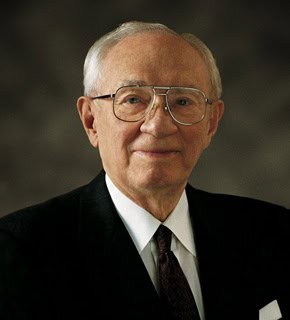 The True Strength of the Church
The True Strength of the Church
He then went on to say: “The fastest growing church [of] over a million members in this country is the Mormon Church, the Latter-day Saints, with headquarters in Salt Lake City, which is growing at five percent a year, [and] that’s a very rapid increase.” This is a most striking commentary, and one that should concern every thoughtful man and woman. One thing that it says is that a religion which requires devotion, which asks for sacrifice, which demands discipline, also enjoys the loyalty of its membership and the interest and respect of others. It was ever thus. The Savior did not equivocate when he said to Nicodemus: “Except a man be born of the water and of the Spirit, he cannot enter into the kingdom of God.” There were no exceptions. There was no permissiveness in complying with the rule. It was so in other matters of which he spoke. Paul never hedged nor quibbled when setting forth the requirements of the gospel of Jesus Christ. It is so today. The Lord himself declared that “strait is the gate and narrow is the way.” Any system dealing with the eternal consequences of human behavior must set guidelines and adhere to them, and no system can long command the loyalties of men that does not expect of them certain measures of discipline, and particularly of self-discipline. The cost in comfort may be great. The sacrifice may be real. But this very demanding reality is the substance of which come character and strength and nobility. . . The yoke of Church responsibility, the burden of Church leadership become opportunities rather than problems to him who wears the mantle of dedicated membership in the church of Jesus Christ.
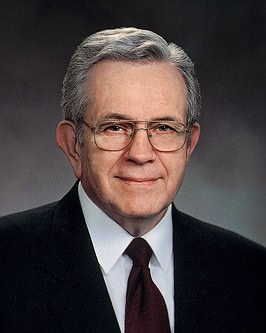 The Unwritten Order of Things
The Unwritten Order of Things
The fundamental doctrine and instructions on the organization of the Church are likewise found in the scriptures. In addition, there is another source of knowledge relating to what makes the Church work: We learn from experience and observation. If you learn about these things that are not written down, the unwritten order of things, you will be better qualified to be a leader–and you are going to be a leader. The most important positions of leadership are in the home–the father, mother, wife, husband, older brother and sister. Then, in the Church, positions of leadership and teaching opportunities are available as nowhere else on earth. . . Our meetings should be conducted in such a way that members may be refreshed spiritually and remain attuned to the Spirit as they meet the challenges of life. . . The one who presides in a meeting should sit on the stand and sit close to the one conducting. It is a bit difficult to preside over a meeting from the congregation. The one who presides is responsible for the conduct of the meeting and has the right and the responsibility to receive inspiration and may be prompted to adjust or correct something that goes on in the meeting. . . Another example: If you watch the First Presidency, you will see that the first counselor always sits on the right of the president; the second counselor on the left. . . We do not aspire to calls in the Church, nor do we ask to be released. We are called to positions in the Church by inspiration. Even if the call is presented in a clumsy way, it is not wise for us to refuse the call. . . A prime attribute of a good leader is to be a good follower. . . An essential attribute of a leader in the Church is faithful and loyal fellowship. That is just the order of things–the unwritten order of things.” . . The Church will move on, and it moves on just because the rank and file learn by observation, learn by teaching, learn by experience. Most of all, we learn because we are motivated by the Spirit. One day, of course, you who are young now will lead the Church. If in the intervening time you will learn and study the unwritten order of things, the power of the Lord will be upon you to the end that you might be the useful servant.
